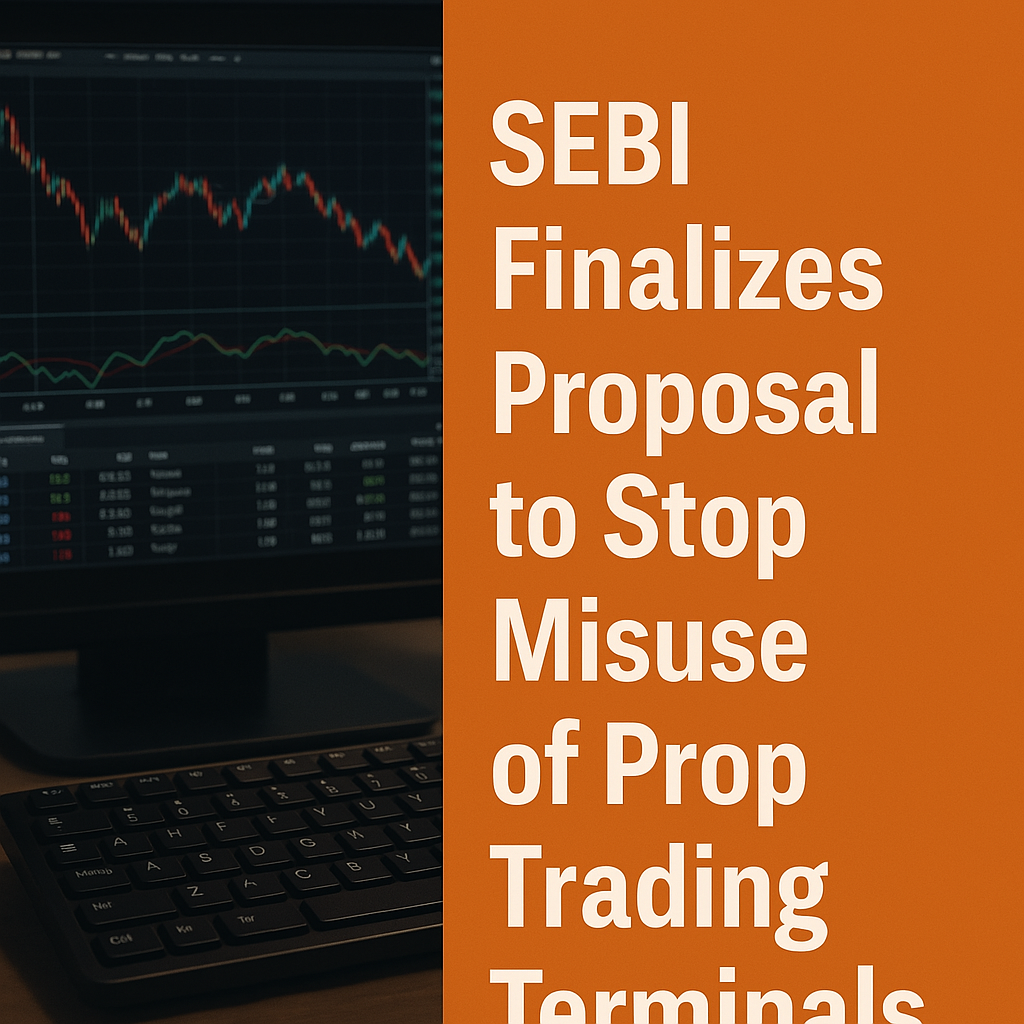View News
SEBI-Finalizes-Measures-to-Curb-Misuse-of-Proprietary-Trading-Terminals

SEBI Finalizes Measures to Curb Misuse of Proprietary Trading Terminals
The Securities and Exchange Board of India (SEBI) has finalized a comprehensive policy aimed at preventing the misuse of proprietary (prop) trading terminals. The proposal has been shared with key stakeholders for feedback, and once the consultation process is complete, stock exchanges will be directed to implement the new framework in consultation with brokers. This move comes amid concerns that prop trading terminals are being exploited for unfair advantages, potentially leading to market distortions and regulatory breaches.
Addressing the Risks in Prop Trading
Proprietary trading involves brokerage firms and institutional players trading on their own accounts rather than executing trades on behalf of clients. While prop trading plays a crucial role in financial markets by enhancing liquidity and price discovery, concerns have been raised over its misuse. Instances of front-running, circular trading, and manipulative algorithmic trading have surfaced, prompting SEBI to tighten its oversight.
For example, in 2015, SEBI imposed penalties on OPG Securities for gaining preferential access to the NSE’s co-location facility, allowing them to execute trades at speeds significantly faster than other market participants. This case highlighted the risks of prop trading abuse, where firms with privileged access could manipulate the market to their advantage.
Legal Provisions Governing Proprietary Trading
SEBI’s new measures align with existing regulatory provisions, including:
-
SEBI (Prohibition of Fraudulent and Unfair Trade Practices) Regulations, 2003 – This regulation prohibits market manipulation, front-running, and misleading trading practices.
-
SEBI (Stock Brokers and Sub-Brokers) Regulations, 1992 – These regulations govern the conduct of brokers and mandate fair dealings in securities markets.
-
Securities Contracts (Regulation) Act, 1956 – This Act lays down the framework for regulating stock exchanges and prohibits certain types of trade practices that disrupt market integrity.
-
SEBI’s Guidelines on Algorithmic Trading (2012 & 2018) – These guidelines regulate high-frequency trading (HFT) and algorithmic strategies used by brokers and prop traders.
Key Aspects of SEBI’s New Framework
The finalized policy aims to introduce several crucial safeguards to ensure that prop trading activities remain within ethical and regulatory boundaries. Some of the significant measures being considered include:
1. Enhanced Monitoring Mechanisms
SEBI is expected to mandate stock exchanges to implement real-time surveillance systems capable of detecting unusual trading patterns, particularly those indicative of front-running or market manipulation. These systems will leverage AI and machine learning to flag suspicious activities.
2. Stricter KYC and Access Control for Prop Trading Terminals
To curb unauthorized access, SEBI may introduce stricter Know Your Customer (KYC) norms, requiring proprietary trading firms to disclose their strategies and maintain logs of user access to trading terminals.
Example:
In 2019, SEBI penalized Karvy Stock Broking Ltd. for misusing client funds and securities for its own proprietary trading, highlighting the need for strict access controls in prop trading desks.
3. Regulation of Algorithmic and High-Frequency Trading (HFT)
The misuse of algorithms in prop trading has raised concerns about market manipulation and flash crashes. SEBI is expected to implement additional checks such as:
-
Registration and approval of all algorithmic strategies
-
Restrictions on order-to-trade ratios to prevent excessive speculative orders
-
Mandatory back-testing and audit trails for algorithms used by prop trading firms
Example:
In 2021, SEBI fined Three broking firms for engaging in "layering" strategies, where high-frequency traders placed and canceled large orders to create a false impression of market demand.
4. Firewall Between Client Trading and Prop Trading
Brokers conducting both client-based trading and proprietary trading may be required to maintain strict segregation between the two to prevent conflicts of interest and misuse of client data.
Example:
SEBI took action against a few brokerage firms that were using non-public client order information to execute profitable trades for their proprietary desks before placing the client’s order, a clear case of front-running.
5. Audit and Compliance Reporting Requirements
Under the new framework, SEBI is expected to mandate quarterly or annual reports from brokerage firms engaged in proprietary trading. These reports will include:
-
Detailed disclosures of prop trading volumes
-
Risk management measures adopted
-
Algorithm audit trails and compliance reviews
6. Stringent Penalties for Violations
SEBI will introduce strict penalties, including monetary fines, license suspension, or even criminal action for firms engaging in fraudulent trading practices.
Example:
In 2019, SEBI imposed a Rs. 25 crore fine on HDFC Securities and Kotak Securities for failing to maintain proper records of their prop trading activities, setting a precedent for stringent enforcement.
Industry Implications and Reactions
While SEBI’s new policy is aimed at curbing misuse, it is also expected to increase compliance costs for brokerage firms. Larger institutional players with robust compliance mechanisms may find it easier to adapt, while smaller firms and retail brokers could face operational challenges.
Market participants have largely welcomed the move, acknowledging that better oversight will boost investor confidence. However, brokers and trading firms have been asked to provide inputs before the final implementation, ensuring a balanced regulatory approach that does not hinder genuine market activity.
Conclusion
SEBI’s latest initiative to regulate proprietary trading terminals marks a crucial step in strengthening India’s capital markets and preventing unfair trading practices. By implementing enhanced monitoring, stricter compliance norms, and legal safeguards, SEBI aims to create a more transparent and fair trading environment.
Once exchanges finalize the implementation framework in consultation with brokers, the new policy is expected to take effect, ensuring a more secure, ethical, and well-regulated trading ecosystem.
"Unlock the Potential of Legal Expertise with LegalMantra.net - Your Trusted Legal Consultancy Partner”
DISCLAIMER: THE CONTENTS OF THIS DOCUMENT ARE PROVIDED BASED ON CURRENT PROVISIONS AND INFORMATION AVAILABLE. WHILE EVERY EFFORT HAS BEEN MADE TO ENSURE ACCURACY AND RELIABILITY, NO RESPONSIBILITY IS ASSUMED FOR ANY ERRORS OR OMISSIONS. USERS ARE ENCOURAGED TO REFER TO APPLICABLE LAWS AND REGULATIONS. THIS INFORMATION IS NOT TO BE CONSTRUED AS LEGAL ADVICE, AND NO LIABILITY IS ACCEPTED FOR ANY CONSEQUENCES ARISING FROM ITS USE.

